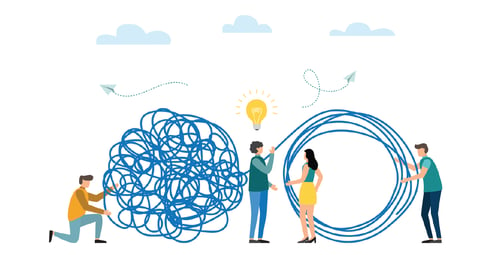Shining a Light on Mental Health Support Over the Holidays

For many people, the holidays bring about memories of bright lights lining streets, decorated trees, and local Santa Claus parades. There is a tangible shift in energy as the year is brought to a close. However, among all the typical holiday festivities, there is the less cheerful side – mental health can worsen this time of year.
The reasons for increased symptoms of poor mental health are plentiful. Routines are disrupted and healthier habits are challenged. Time is stretched thin in order to attend additional gatherings. Sadness and grief may increase as loved ones are missed. Financial stress is present due to gift giving and holiday travel. Fear about infectious diseases, for oneself or for a loved one, is an ongoing concern. And these stressors may be encountered amid the shift in seasons, bringing shorter and darker days – a particular challenge for those who experience seasonal affective disorder (SAD).
To ensure all employees are supported throughout the holidays, are steps employers can take, many of which can be found in typical health and wellness strategies.
Need a resource you can share with HR and senior leadership? Download our infographic with 7 tips on how to provide mental health support your employees over the holiday season with 7 tips.
Acknowledge and Remind
It is important for employers to recognize the positive and negative sides of the holidays so that employees feel seen. As this time of year can be particularly stressful, employers should acknowledge that this is not a cheerful time for everyone and that they do not have to seem happy if they do not feel that way. For example, employers might remind employees that there is no pressure to attend holiday gatherings and events.
On the other hand, it is important to wish your employees a wonderful holiday, in whichever way they celebrate – whether that be Christmas, Hanukkah, Kwanzaa, or a secular celebration. The benefit of doing this is two-fold: it is a kind gesture that recognizes the importance of this time of year for some people, and it demonstrates diversity and inclusion within the organization.
Positive or negative, senior leaders in the organization may choose to share personal stories that help employees feel less alone in their experience of the holiday season. This also sets the precedent and can help challenge the existing stigma around mental health.
Beyond acknowledgement, this is an opportune time to remind employees about the support they have available to them. For instance, if your organization offers financial coaching or access to therapy, letting employees know they exist and how to access them would not only support those who need them, but it would also help employers identify gaps in their health and wellness programming and determine what is or is not working within their existing offering.
Communicate
While we do not want to overwhelm employees with too many events or communications this time of year, it may be worth considering a mental health communication campaign. Sharing tips that employees can adopt over the holiday season, such as encouraging healthy habits, is one such way. The following are examples of tips an employer may communicate:
- Build in opportunities for exercise or mindfulness activities, such as going for a walk while the sun is out
- Moderate substance use, especially if you use them to cope with stress
- Reach out to trusted people if you’re feeling isolated and/or lonely
- Politely decline invites if you’re feeling overwhelmed, depressed, or anxious
These tips can be supplemented by resources employees can access if in need or in crisis. From your organization’s EAP contact information to a provincial or national crisis hotline, individuals with diverse needs can benefit from internal and external support that is available to them.
They can be easily distributed across company channels, including emails, messaging apps (such as Slack or Teams), or via posters in offices or larger meeting spaces. This may seem unnecessary, but it can deeply benefit those who are experiencing hardships.
Learn and Adapt
It is important that managers and senior leaders are equipped with the knowledge they need to recognize symptoms of poor mental health in their employees. Though leadership may have already completed mental health training, reminders or additional training are never a bad idea.
Further, if there is potential to revamp an organizational policy or practice, this time of year can be the opportunity to do so. More specifically, upholding work-life balance, especially during this busy time of year, may help mitigate stress and other mental health challenges. Reviewing holiday time-off, building in breaks during the day, and adopting a flexible work schedule can all go a long way in displaying compassion for personal obligations and encouraging a healthy balance. If your organization has the capacity, consider giving extra paid time off or even a holiday bonus. This can give individuals their much-needed rest and perhaps allow them to invest in their health and wellness, such as purchasing a light therapy lamp for SAD.
These organizational adaptations can support employees across the board. Those whose families live far away, for example, may benefit from this as it can give them the option to travel to see their loved ones. Additionally, employees who are caregivers have unique situations, whether they are caring for a child, an aging parent, or a loved one with an illness or disability. As caregivers have additional challenges with their mental health and well-being, giving them more time and support to do what they need to is crucial.
With the holiday season among us, there is no better time to reflect on workplace mental health. Successful organizations embody a culture of care. It is important to remember that there are various reasons why employees may not feel comfortable or happy this time of year, but employers can be a positive force to help their people feel supported during, and beyond, the holidays.
With that said, we wish you a restful and healthful holiday season!

About The Author
Sammy Chown
Sammy Chown is the Public Health Researcher at Carebook Technologies. Completing her MSc in Public Health and Health Systems, she has a passion for improving the health of populations across the lifespan, especially as it relates to mental health and accessibility.



